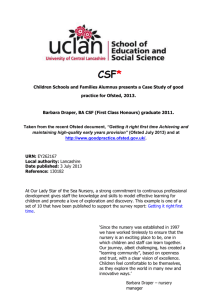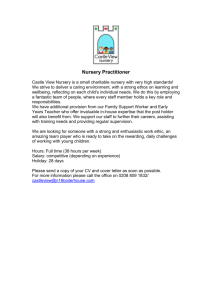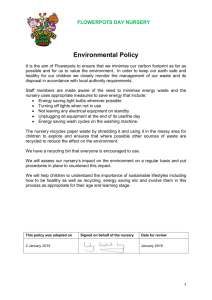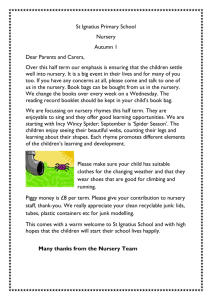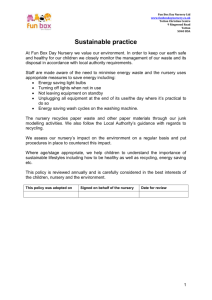Brunton Nursery
advertisement
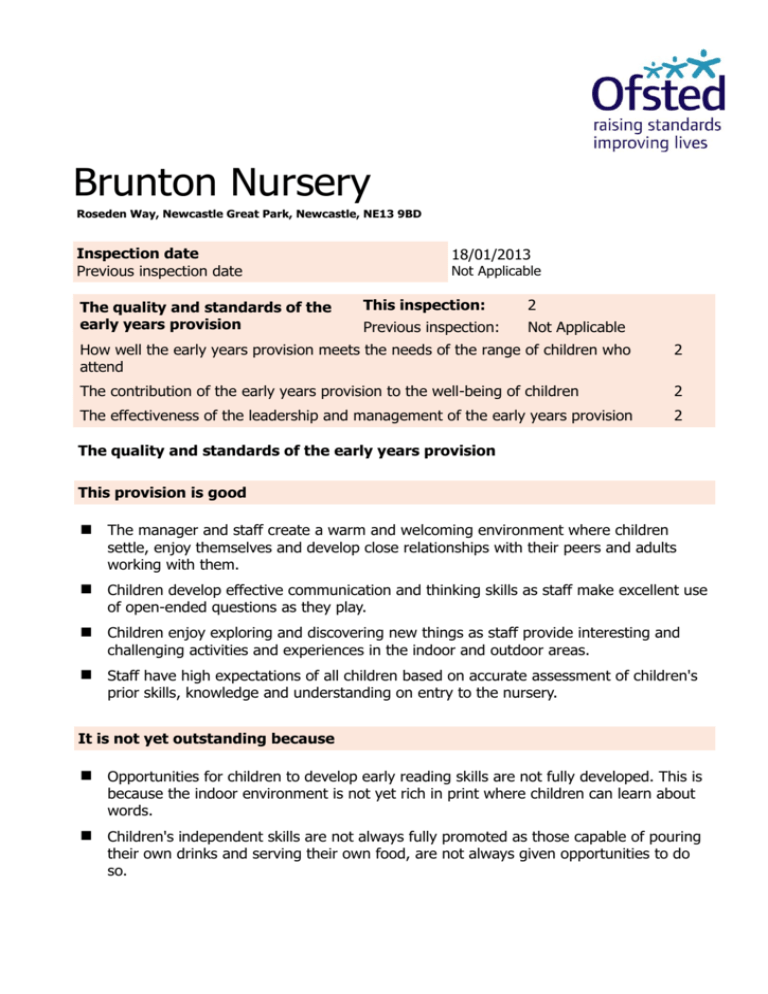
Brunton Nursery Roseden Way, Newcastle Great Park, Newcastle, NE13 9BD Inspection date Previous inspection date The quality and standards of the early years provision 18/01/2013 Not Applicable This inspection: 2 Previous inspection: Not Applicable How well the early years provision meets the needs of the range of children who attend 2 The contribution of the early years provision to the well-being of children 2 The effectiveness of the leadership and management of the early years provision 2 The quality and standards of the early years provision This provision is good The manager and staff create a warm and welcoming environment where children settle, enjoy themselves and develop close relationships with their peers and adults working with them. Children develop effective communication and thinking skills as staff make excellent use of open-ended questions as they play. Children enjoy exploring and discovering new things as staff provide interesting and challenging activities and experiences in the indoor and outdoor areas. Staff have high expectations of all children based on accurate assessment of children's prior skills, knowledge and understanding on entry to the nursery. It is not yet outstanding because Opportunities for children to develop early reading skills are not fully developed. This is because the indoor environment is not yet rich in print where children can learn about words. Children's independent skills are not always fully promoted as those capable of pouring their own drinks and serving their own food, are not always given opportunities to do so. Inspection report: Brunton Nursery, 18/01/2013 2 of 9 Information about this inspection Inspections of registered early years provision are scheduled: at least once in every inspection cycle. The current cycle ends on 31 July 2016 more frequently where Ofsted identifies a need to do so, for example where provision was previously judged as inadequate brought forward in the inspection cycle where Ofsted has received information that suggests the provision may not be meeting the legal requirements of the Early Years Foundation Stage; or where assessment of the provision identifies a need for early inspection prioritised for inspection where we have received information that the provision is not meeting the requirements of the Early Years Foundation Stage and which suggests children may not be safe at the completion of an investigation into failure to comply with the requirements of the Early Years Foundation Stage. The provision is also registered on the voluntary and compulsory parts of the Childcare Register. This report includes a judgment about compliance with the requirements of that register. Inspection activities The inspector carried out a tour of the premises. The inspector observed play and learning activities in all nursery rooms. The inspector carried out a joint observation with the deputy manager. The inspector took account of the views of parents and carers spoken to on the day. Inspector Nicola Jones Full Report Information about the setting Brunton Nursery was registered in 2012 on the Early Years Register and the compulsory and voluntary parts of the Childcare Register. It is situated in a purpose built premises in the Great Park area of Newcastle Upon Tyne, and is managed by Childcare Enterprise Limited. The nursery serves the local area and is accessible to all children. There is a fully enclosed area available for outdoor play. The nursery employs 15 members of childcare staff. Of these, 14 hold appropriate early years qualifications at level 3 or above and one member of staff has a level 2 qualification Inspection report: Brunton Nursery, 18/01/2013 3 of 9 and is working towards level 3. There are two members of staff with Early Years Professional Status. The manager and deputy are degree qualified and two senior staff have completed Foundation Degrees.The nursery opens Monday to Friday all year round. Sessions are from 7.45am until 6pm. Children attend for a variety of sessions. There are currently 92 children attending who are in the early years age group. The nursery provides funded early education for three- and four-year-old children. It supports a number of children who speak English as an additional language and children with special educational needs and /or disabilities. What the setting needs to do to improve further To further improve the quality of the early years provision the provider should: develop the educational programme for literacy further by creating an environment which is rich in print where children can learn about words, for example, using names, signs and posters develop young children's independence further by allowing them to pour their own drinks and serve food. Inspection judgements How well the early years provision meets the needs of the range of children who attend Children thoroughly enjoy the time they spend at nursery. This is because staff have a good understanding of the learning and development requirements; they are well deployed, enthusiastic and eager to help all children settle into the group. Children explore and discover new things as staff provide a wide range of interesting and challenging experiences on a daily basis. The indoor environment contains resources which are appropriate, well maintained and accessible for all children. As a result, children are able to find the equipment they require and make independent choices from the wide selection available. The outdoor environment was not accessible on the day of inspection due to extreme weather conditions. However, evidence from children's learning journals show activities provided in this area have a positive impact on children's sense of well-being and help all aspects of children's development. Overall, children's reading skills are promoted well in the nursery. Books used by young children have a rich variety of text. Staff encourage and support children's responses to picture books and stories as they read to them. Very young children learn how to turn the pages correctly and point to pictures which interest them. They are happy to sit alongside others and independently select their own books from baskets. Older children are Inspection report: Brunton Nursery, 18/01/2013 4 of 9 beginning to link sounds to letters and some are naming and sounding the letters of the alphabet. This is because staff provide opportunities and activities for children to play with letters and sounds which provides a strong foundation for future reading development. However, opportunities to further enhance children's early reading skills are not fully developed. The indoor environment is not yet rich in print where children can learn about words, for example, by using names, signs and posters. The manager has accurately identified this through the self-evaluation process as an area for improvement. Children are well supported in their development in all other areas of learning. Staff are highly skilled when using open-ended questions which encourages children to develop effective communication and thinking skills. Children with English as an additional language are equally well supported. Staff obtain key vocabulary from parents and carers and provide opportunities for children to develop and use their home language in play and learning activities. Physical skills are developed as children engage in a variety of activities to promote early mark making. For example, staff spray shaving foam onto table tops and children enjoy using both hands to make marks and draw shapes, such as circles and lines. Awareness of number and counting is encouraged through everyday activities and children enjoy counting objects as they play. Children are provided with a wide range of opportunities to use technology. Each room has a tablet computer and children learn how to operate simple programs to enhance their learning. As a result, children effectively develop the key skills they need for the next steps in their learning, including those required when they attend school. Staff have a good understanding of how to promote the learning and development of young children. Practice is consistently good and occasionally outstanding. Staff have high expectations of all children based on accurate assessment of children's prior skills, knowledge and understanding on entry to the nursery. Good planning and assessment systems are in place and children's progress is tracked effectively. As a result, staff are confident in identifying individual strengths and weaknesses in learning. Parents are provided with information about their child's progress and there are new systems in place which aim to further support children's learning at home. The contribution of the early years provision to the well-being of children A well-established key person system is in place which helps children to form secure attachments and promotes their well-being and independence. Children are happy and enjoy what they are doing at nursery and like to cuddle into their key person throughout the day. A stimulating, well-resourced and welcoming environment is provided which supports children's all-round development and emotional well-being. Children develop independence as they are able to find and return what they need. Staff encourage children to manage their own hygiene and acknowledge and encourage their efforts to manage their personal needs. However, opportunities to further enhance children's independence are missed when they are not provided with opportunities to serve their own food and pour their own drinks. Children develop an understanding of a healthy diet as they are provided with balanced and nutritious meals, snacks and drinks. Staff sit alongside children as they eat and talk Inspection report: Brunton Nursery, 18/01/2013 5 of 9 about which foods are good for them and why. Staff are skilled at recognising children's need for physical exercise. For example, children access the soft play room when they are unable to go into the outdoor area due to icy conditions. Staff comfort children when they are tired and a calm and soothing environment is created when children need to rest. Music is played in each room throughout the day which creates a harmonious feel throughout the nursery. Staff provide very good role models for children by giving gentle reminders of expectations within the nursery. They skilfully deal with minor conflicts by effectively diverting children's attention. For example, staff approach children playing in a tent and say 'fee-fi-fo-fum'. Children are distracted from conflict and begin to share their knowledge of traditional tales. Staff reinforce rules with older children throughout their play and talk about keeping areas of their room tidy. As a result, children behave exceptionally well in the nursery and respond effectively to requests from staff. Children are prepared for the transitions they make within the nursery. They make visits with their key person and information is shared to ensure there is continuity in their learning and development and welfare. Although the nursery has only been open for a relatively short period, the manager has been proactive in developing links with Brunton First School. The nursery is situated in close proximity to the school and many children will transfer once they become statutory school age. A system has been introduced where small groups of pre-school children visit the reception class on a weekly basis throughout the year. In addition, children from the reception class make weekly visits to the preschool room in nursery. This system aims to ensure children are well prepared for their transition and next stage in their learning. The effectiveness of the leadership and management of the early years provision The manager has a good overview of the curriculum and monitors educational programmes to ensure children are helped to make progress in all areas of learning. She has strong knowledge of the Early Years Foundation Stage and uses this well to support her staff. As a result, staff are enthusiastic and clearly enjoy working as part of the team. Planning and assessment systems are monitored effectively and the manager spends time working in all nursery rooms to gain first-hand knowledge about what is working well and address issues raised. The manager and deputy carry out joint observations of practice to monitor the quality of teaching and ensure training needs are identified effectively. This is further monitored through supervision which provides support, coaching and training to meet individual staff needs. Children are safeguarded because the manager and staff have clear policies and procedures embedded within their practice. Effective recruitment and vetting procedures are in place. As a result of comprehensive induction to the nursery, staff are fully aware of their roles and responsibilities in keeping children safe. The manager ensures staff knowledge is secure and uses prompts, such as 'Safeguarding question of the week' to check understanding. Systems are in place to ensure the areas used by children are safe, and as a result, they display a very good awareness of safety. Self-evaluation takes into account the views of staff, children and parents. Views are Inspection report: Brunton Nursery, 18/01/2013 6 of 9 sought through one-to-one meetings with staff, ongoing discussions with children and opportunities for parents to talk openly to staff or provide written comments. The manager has a strong drive to improve the nursery and has a clear and successful improvement plan that supports children's achievement over time. There are good links with the local authority and the manager works well with the local Surestart teacher which further enhances the self-evaluation process. Partnerships with parents and Brunton First School are a clear strength of the nursery. Parents are delighted with the information provided about their child and use words such as 'brilliant' when describing the quality of care provided by staff. Although the nursery has only been open for a relatively short period, relationships with the school are good and make a strong contribution to meeting children's needs. The nursery works well with other agencies, such as speech and language therapy services. This ensures appropriate interventions are secured for children and they receive the support they need. The Childcare Register The requirements for the compulsory part of the Childcare Register are Met The requirements for the voluntary part of the Childcare Register are Met What inspection judgements mean Registered early years provision Grade Judgement Description Grade 1 Outstanding Outstanding provision is highly effective in meeting the needs of all children exceptionally well. This ensures that children are very well prepared for the next stage of their learning. Grade 2 Good Good provision is effective in delivering provision that meets the needs of all children well. This ensures children are ready for the next stage of their learning. Grade 3 Satisfactory Satisfactory provision is performing less well than expectations in one or more of the key areas. It requires improvement in order to be good. Grade 4 Inadequate Provision that is inadequate requires significant improvement and/or enforcement. The provision is failing to give children an acceptable standard of early years education and/or is not meeting the safeguarding and welfare requirements of the Early Years Foundation Stage. It will be inspected again within 12 months of the date of this inspection. Met The provision has no children on roll. The inspection judgement Inspection report: Brunton Nursery, 18/01/2013 7 of 9 is that the provider continues to meet the requirements for registration. Not Met The provision has no children on roll. The inspection judgement is that the provider does not meet the requirements for registration. Inspection This inspection was carried out by Ofsted under Sections 49 and 50 of the Childcare Act 2006 on the quality and standards of provision that is registered on the Early Years Register. The registered person must ensure that this provision complies with the statutory framework for children’s learning, development and care, known as the Early Years Foundation Stage. Setting details Unique reference number EY451400 Local authority Newcastle Inspection number 810854 Type of provision Registration category Childcare - Non-Domestic Age range of children 0 - 17 Total number of places 66 Number of children on roll 92 Name of provider Childcare Enterprise Ltd Date of previous inspection Not applicable Telephone number Any complaints about the inspection or the report should be made following the procedures set out in the guidance ‘raising concerns and making complaints about Ofsted', which is available from Ofsted’s website: www.ofsted.gov.uk. If you would like Ofsted to send you a copy of the guidance, please telephone 0300 123 4234, or email enquiries@ofsted.gov.uk. Type of provision For the purposes of this inspection the following definitions apply: Inspection report: Brunton Nursery, 18/01/2013 8 of 9 Full-time provision is that which operates for more than three hours. These are usually known as nurseries, nursery schools and pre-schools and must deliver the Early Years Foundation Stage. They are registered on the Early Years Register and pay the higher fee for registration. Sessional provision operates for more than two hours but does not exceed three hours in any one day. These are usually known as pre-schools, kindergartens or nursery schools and must deliver the Early Years Foundation Stage. They are registered on the Early Years Register and pay the lower fee for registration. Childminders care for one or more children where individual children attend for a period of more than two hours in any one day. They operate from domestic premises that are usually their own home. They are registered on the Early Years Register and must deliver the Early Years Foundation Stage. Out of school provision may be sessional or full-time provision and is delivered before or after school and/or in the summer holidays. They are registered on the Early Years Register and must deliver the Early Years Foundation Stage. Where children receive their Early Years Foundation Stage in school these providers do not have to deliver the learning and development requirements in full but should complement the experiences children receive in school. Inspection report: Brunton Nursery, 18/01/2013 9 of 9 The Office for Standards in Education, Children's Services and Skills (Ofsted) regulates and inspects to achieve excellence in the care of children and young people, and in education and skills for learners of all ages. It regulates and inspects childcare and children's social care, and inspects the Children and Family Court Advisory Support Service (Cafcass), schools, colleges, initial teacher training, work-based learning and skills training, adult and community learning, and education and training in prisons and other secure establishments. It assesses council children’s services, and inspects services for looked after children, safeguarding and child protection. If you would like a copy of this document in a different format, such as large print or Braille, please telephone 0300 123 4234, or email enquiries@ofsted.gov.uk. You may copy all or parts of this document for non-commercial educational purposes, as long as you give details of the source and date of publication and do not alter the information in any way. To receive regular email alerts about new publications, including survey reports and school inspection reports, please visit our website and go to ‘Subscribe’. Piccadilly Gate Store St Manchester M1 2WD T: 0300 123 4234 Textphone: 0161 618 8524 E: enquiries@ofsted.gov.uk W: www.ofsted.gov.uk © Crown copyright 2012

